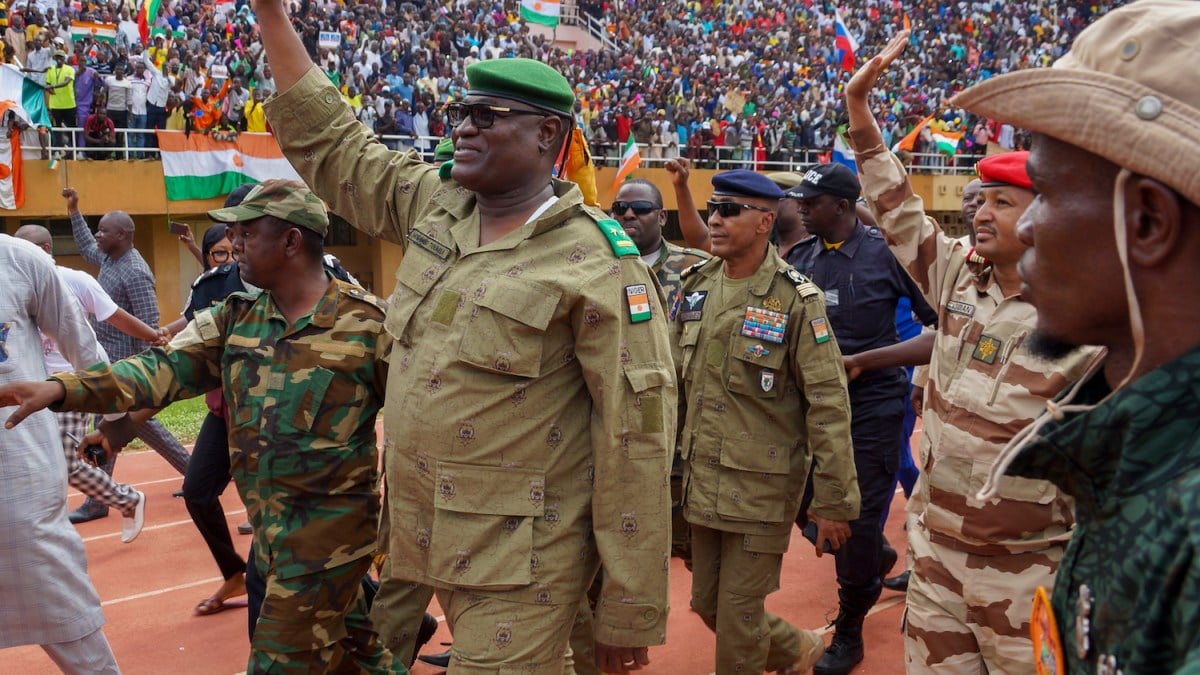By Agboola Aluko
April 10, 2025 | 3-Minute Read
N iger’s military junta, in power since ousting President Mohamed Bazoum in a July 2023 coup, has disbanded three unions representing key paramilitary forces, further consolidating its grip on the country’s security apparatus. The decision, formalized in a decree from the Ministry of the Interior on Wednesday, April 9, 2025, targets unions critical to Niger’s struggle against insurgent groups tied to Al-Qaeda and the Islamic State, which have plagued the Sahel region for over a decade.
The regime, headed by General Abdourahamane Tiani, has prioritized centralizing authority amid ongoing instability. The dissolved unions—the National Union of Customs Officers (SNAD), the National Union of Water and Forestry Officers (SYNACEF), and the National Union of Water and Forestry Workers (SNATEF)—represent personnel integral to border security, resource management, and anti-smuggling efforts, all of which intersect with Niger’s counterinsurgency campaigns. The decree, signed by Interior Minister General Mohamed Toumba, cites Article 39 of the junta’s transition charter, enacted on March 26, 2025, which bans defense and security forces, including paramilitary units, from forming or joining unions.
This move echoes historical precedent in Niger. Between 1996 and 1999, under General Ibrahim Bare Mainassara’s military regime, the police union (SUPO) and customs union were similarly dissolved, only for the latter to be reinstated after Mainassara’s assassination. The current junta’s actions suggest a broader strategy to eliminate organized dissent within security ranks, a concern heightened by reports of low morale and logistical strains among troops battling insurgents in the Diffa, Tillabéri, and Tahoua regions.
Niger’s security forces, including the army, police, customs service, and water and forestry units, are linchpins in combating the violence that has killed thousands and displaced over 700,000 people since 2015. The customs service, for instance, monitors porous borders with Nigeria, Mali, and Burkina Faso—hotspots for arms trafficking and militant activity—while water and forestry officers regulate resource access in areas where competition fuels conflict. The junta’s decision to dissolve their unions has sparked debate about its impact on operational effectiveness, with some analysts warning it could deepen discontent among underpaid and overstretched personnel.
The transition charter, dubbed the "Charter of Refoundation," serves as Niger’s interim governing framework following the suspension of the 2010 constitution. It mandates a minimum five-year period of military rule, though this timeline could shift depending on the security situation. General Tiani has framed the charter as a roadmap to stabilize Niger and rebuild its institutions, promising a return to civilian governance only when conditions permit. Critics, however, view the union dissolutions as part of a broader clampdown on civil liberties, pointing to the junta’s earlier bans on political parties and protests.
The backdrop to these measures is grim. In 2024 alone, militant attacks reportedly claimed over 1,200 lives, with groups like Jama’at Nasr al-Islam wal Muslimin (JNIM) and the Islamic State in the Greater Sahara (ISGS) exploiting Niger’s fragile post-coup state. The junta has sought foreign support, pivoting from its former Western allies—France withdrew its last troops in December 2023—to Russia, which has supplied drones and mercenaries from the Wagner Group’s successor, Africa Corps. Yet, insecurity persists, and the dissolution of unions risks alienating the very forces tasked with restoring order.
Public reaction has been muted, with state media framing the decree as a necessary step to “streamline” security operations. However, in Niamey’s markets and online forums, some citizens have voiced skepticism, questioning whether the junta’s focus on control will address root causes like poverty and corruption that fuel unrest. As Niger navigates this turbulent chapter, the disbandment of these unions underscores the military’s determination to reshape the country—though whether it can deliver stability remains an open question.





0 Comments